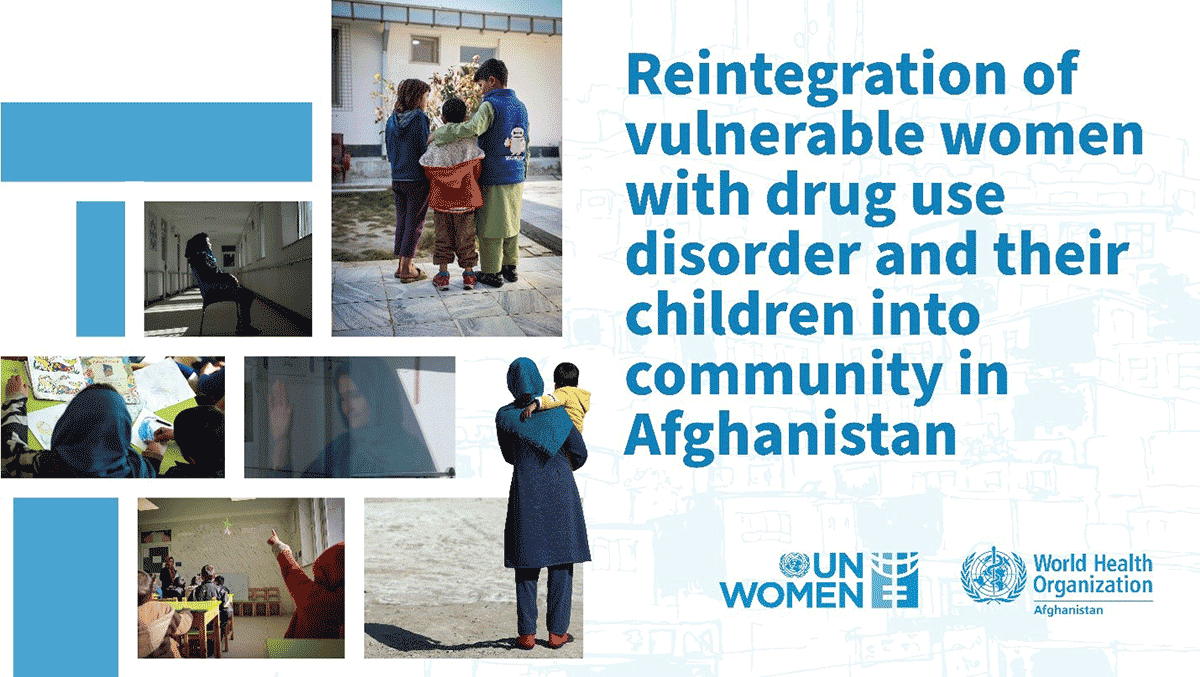 17 July 2024, Kabul, Afghanistan – A new initiative to reintegrate vulnerable women with substance use disorders and their children into the community has been launched in Afghanistan. Women will be supported through a comprehensive package of protection services, substance use disorder treatment and mental health services.
17 July 2024, Kabul, Afghanistan – A new initiative to reintegrate vulnerable women with substance use disorders and their children into the community has been launched in Afghanistan. Women will be supported through a comprehensive package of protection services, substance use disorder treatment and mental health services.
Afghanistan has had a significant substance use problem for decades, made worse by continuous conflict and instability. Nearly 4 million people – about 10% of the population – are affected by substance use disorders. The new initiative is a joint effort by the World Health Organization (WHO) and UN Women to tackle this pressing health issue, specifically among women and children.
The initiative adopts a holistic and gender-sensitive approach to improve access to integrated mental health and psychosocial support services and to provide quality substance use disorder treatment services for affected women. It will also enhance the capacities of key health staff in targeted facilities to deliver gender-responsive and trauma-informed services.
To ensure continuity of care and reduce stigma associated with mental health and substance use disorders, community-based outreach and mobile protection services will also be considered.
“This WHO–UN Women collaboration signifies our strong commitment to tackling the urgent challenges of substance use disorders. By prioritizing the needs of women and children, we strive to advance public health in Afghanistan and build a more resilient society where everyone has equal access to health,” said Dr Edwin Ceniza Salvador, WHO Representative and Head of Mission in Afghanistan.
The high prevalence of such disorders among women and children heightens the urgent need to address this issue – especially as adverse effects of substance use extend beyond individuals.
“Media and anecdotal reports point to a sharp decline in women’s mental health, exacerbated by their increasing social isolation, and the scarcity of – and stigma around accessing – support services. Our collaboration with WHO will seek to provide comprehensive and much-needed support,” said Ms Alison Davidian, UN Women Special Representative to Afghanistan.
In launching this joint initiative, WHO and UN Women reaffirm their commitment to protecting the rights of women and children whose health, development and well-being are most affected by substance use disorders. Taking action to support women and children with substance use disorders can end cycles of harm and deprivation within households.
Media contacts
Ajyal Sultany, acting Head of Communications, WHO Afghanistan
Email:
Nourhan El-Nagdy, Donor Communication Officer, WHO Afghanistan
Email:
Olguta Anghel, Head of Communications and Advocacy, UN Women Afghanistan
Email:
About the World Health Organization (WHO)
The World Health Organization (WHO) is a specialized agency of the United Nations responsible for international public health. Founded in 1948, WHO works globally to promote health, keep the world safe, and serve the vulnerable. WHO leads efforts to combat health emergencies, prevent diseases, and achieve universal health coverage.
By coordinating with governments, health agencies, and communities, WHO ensures access to essential health services, develops health policies, and provides technical assistance.
In Afghanistan, WHO is dedicated to improving health outcomes, particularly for women and children, by addressing critical issues such as substance use disorders and mental health through targeted initiatives and partnerships.
Follow WHO Afghanistan:
Website: www.who.int
X (formerly Twitter): @WHOAfghanistan
Facebook: @WHOAfghanistan
About UN Women
UN Women is the United Nations entity dedicated to gender equality and the empowerment of women. A global champion for women and girls, UN Women was established to accelerate progress on meeting their needs worldwide.
UN Women Afghanistan has been in Afghanistan for more than 2 decades and continues undaunted in its support for Afghan women and girls. Informed by analysis of their needs, and with the goal of empowering Afghan women and girls to lead change, its programming is focused on 4 key priorities: gender in humanitarian action, ending violence against women, women’s economic empowerment, and women, peace and security.
Follow UN Women Afghanistan:
Website: https://asiapacific.unwomen.org/en/countries/afghanistan
X (formerly Twitter): @unwomenafghan
Facebook: @UNWomenAfghanistan


